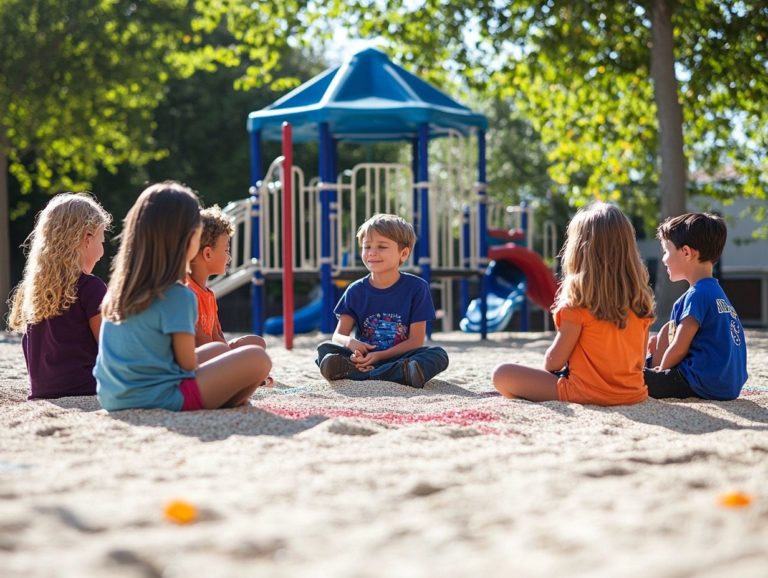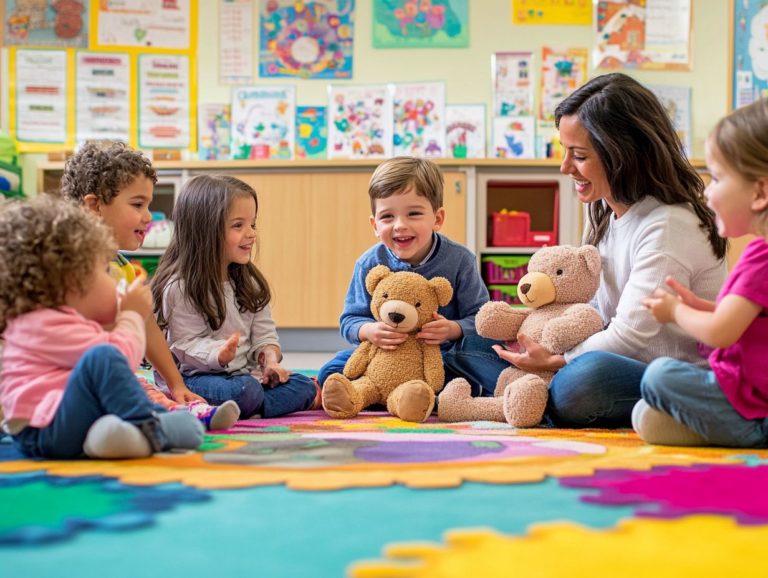Exploring Emotions During Family Activities
Emotions play a crucial role in your everyday life, fundamentally shaping how you interact with family and friends, especially young children.
By gaining a deeper understanding of these feelings, you can enhance your family dynamics, fostering stronger bonds and promoting healthier communication. This article delves into the importance of emotions, emotional development, and teaching emotions, especially during family activities.
It examines the common emotions encountered in these settings, offering effective strategies to encourage emotional expression and highlighting the benefits of exploring feelings together, such as through feelings lists and games.
Explore how engaging in shared experiences, like games or collaborative projects, can lead to deeper connections and enhanced emotional intelligence within your family.
Contents
- Key Takeaways:
- What Are Emotions in Children and Family Dynamics?
- Why Are Emotions Important?
- How Do Emotions Affect Family Dynamics?
- How Can Family Activities Help Explore Emotions?
- What Are Some Tips for Encouraging Emotional Expression During Family Activities?
- What Are the Benefits of Exploring Emotions During Family Activities?
- Exploring Emotions During Family Activities
- How Can Families Continue to Explore Emotions Outside of Family Activities?
- Frequently Asked Questions
- What are some fun activities that families can do to explore emotions?
- How can exploring emotions during family activities benefit children?
- Are there any resources or tools that can assist families in exploring emotions during activities?
- Why is it important for parents and caregivers to be involved in exploring emotions with their children?
- Can exploring emotions during family activities help children deal with difficult emotions?
- How can families make exploring emotions during activities a regular part of their routine?
Key Takeaways:

- Emotions play a vital role in shaping family dynamics and relationships.
- Engaging in family activities, such as feelings bingo and puppet play, can help members explore and express their emotions in a safe and supportive environment.
- Regular communication and open expression of emotions within the family can lead to improved relationships, increased emotional intelligence, and enhanced problem-solving skills.
What Are Emotions in Children and Family Dynamics?
Emotions are intricate psychological states that weave together physiological arousal, cognitive interpretations, and behavioral responses, fundamentally shaping the emotional development of young children. They dictate how children perceive and engage with their surroundings, significantly influencing their social-emotional growth and overall cognitive development.
By fostering an understanding of emotions, you enable children to articulate their feelings, navigate social interactions with ease, and cultivate essential emotional regulation strategies skills that are vital for their long-term emotional well-being, social-emotional development, and cognitive development.
Why Are Emotions Important?
Emotions are essential to your overall development, particularly during childhood. They not only shape your social interactions but also play a crucial role in cognitive growth and emotional regulation.
By understanding emotions, you gain the ability to interpret your feelings, enhance your capacity for empathy, and navigate the complexities of social dynamics and emotional regulation.
Moreover, mastering the management of your emotions establishes a strong foundation for resilience, elevates your self-esteem, and cultivates healthy relationships.
How Do Emotions Affect Family Dynamics?
Emotions play a pivotal role in shaping family dynamics, influencing communication patterns, relationship quality, and the overall emotional climate of your home. When family members openly share their feelings, it cultivates a supportive environment where emotional growth can truly flourish.
On the flip side, unregulated emotions can give rise to misunderstandings, conflicts, and emotional turmoil, impacting the way your family functions as a cohesive unit. Therefore, grasping and discussing emotions is crucial for nurturing a healthy family dynamic. Incorporating mindfulness techniques can help manage these emotions effectively.
What Are Some Common Emotions Experienced During Family Activities?
Throughout various family activities, you ll find yourself navigating a vivid tapestry of emotions joy, frustration, love, and excitement all essential for fostering emotional expression and deepening family bonds. Whether it s during game nights, family outings, or collaborative projects, these activities provide the perfect backdrop for meaningful connections.
By recognizing and discussing these emotions, you not only promote emotional development but also enhance the relationships within your family unit, thanks to activities like emotion charades and puppet play.
Take, for instance, a lively family game night that ignites joy and laughter, while a hiking trip might instill a sense of adventure and accomplishment. However, it’s equally common for feelings of frustration to bubble up during competitive games, emphasizing the importance of communication.
When your family takes the time to acknowledge these emotional shifts celebrating triumphs or empathizing with losses you cultivate a safe space for everyone to express their feelings openly.
This validation not only strengthens your bonds but also imparts vital emotional skills, enabling each family member to navigate their feelings constructively and nurturing a supportive environment for all involved, including young children, parents, and educators.
How Can Family Activities Help Explore Emotions?
Family activities serve as a remarkable avenue for diving into emotions, enabling both parents and children to engage in meaningful discussions that foster emotional learning and regulation. Activities like feelings dice, scenario brainstorming, and role-play encourage this exploration.
Activities like feelings bingo, role-play, and puppet play offer children the chance to express their feelings and learn to interpret their emotions within a safe and nurturing setting. These interactive experiences are invaluable for teaching emotions and enhancing feelings vocabulary.
By weaving emotional exploration into the fabric of everyday family life, you can enrich your family’s emotional vocabulary and gain a deeper understanding of the subtleties of emotional expression.
What Types of Family Activities Are Best for Exploring Emotions?

You ll discover that several engaging family activities can be remarkably effective for exploring emotions, such as feelings collages, emotion charades, and feelings discussions. Each of these is designed to enhance emotional awareness and expression. They not only entertain but also encourage open communication about feelings, allowing family members to share their experiences in a constructive manner.
These interactive experiences are invaluable for building emotional intelligence and fostering understanding within the family.
For instance, when you create feelings collages, you re visually representing your emotions through images and words. This prompts insightful discussions about why you chose certain elements and what those feelings mean to you.
In the same vein, playing emotion charades invites you to embody different feelings, teaching you empathy and honing your non-verbal communication skills. Regular feelings discussions offer a safe space for you and your family to articulate thoughts, facilitating deeper connections and understanding.
Together, these activities cultivate an enriching environment where emotional exploration is not just acknowledged but actively embraced. Educational resources like books by Dr. Seuss, Aliki, Janan Cain, Judith Viorst, and Todd Parr can support this journey.
What Are Some Tips for Encouraging Emotional Expression During Family Activities?
Encouraging emotional expression during family activities is vital for the emotional development of young children, and you can achieve this through several thoughtful strategies and mindfulness techniques.
It s essential to create a safe and supportive environment where feelings can be openly discussed; this lays the groundwork for healthy emotional dialogue. Moreover, incorporating engaging activities such as feelings dice or scenario brainstorming can transform the act of expressing emotions into something enjoyable and accessible.
This approach not only makes it easier for children to articulate their thoughts and feelings but also fosters a deeper connection within the family. These methods are essential for both parents and educators.
What Are the Benefits of Exploring Emotions During Family Activities?
Exploring emotions during family activities brings a wealth of benefits to your household. You ll notice improved communication, strengthened bonds, heightened emotional intelligence, and enhanced problem-solving skills. Incorporating books, games, and activities focused on emotions can greatly aid this process.
By engaging in open discussions about feelings, each family member gains a deeper understanding of one another, fostering empathy and connection. These skills are essential, not just for your individual emotional growth, but also for nurturing a cohesive family unit capable of navigating life s challenges together.
1. Improved Communication and Understanding
Exploring emotions during family activities offers significant benefits, notably in enhancing communication and understanding, which are vital for fostering healthy relationships. When you and your family members express your emotions openly, you create an environment rich in trust and empathy, paving the way for more effective dialogues. This deeper understanding can help you prevent conflicts and strengthen emotional bonds among each other.
For example, holding regular family meetings can serve as a safe space for everyone to share their feelings about daily challenges, successes, or concerns. Engaging in fun projects or creative expressions like art or storytelling can promote profound emotional exploration. These activities not only enhance active listening skills but also enable everyone to express their feelings constructively.
Model emotional expression during shared experiences to cultivate a culture of openness within your family, where communication flourishes, resulting in stronger connections and more harmonious interactions.
2. Strengthened Bonds and Relationships
Exploring emotions through family activities can greatly enhance your relationships, forging stronger bonds within your family unit. When you and your loved ones engage in activities that encourage emotional sharing, you cultivate deeper connections and mutual respect both of which are essential for nurturing healthy relationships.
Imagine the joy of a weekly game night where laughter fills the room! Not only will you enjoy some lighthearted competition, but you can also share stories about how winning or losing makes you feel. Incorporate activities like feelings bingo, where everyone shares how they feel, or emotion charades to make it more engaging. Collaborating on projects like cooking meals together fosters communication and teamwork, giving everyone a chance to voice their preferences and emotions while enhancing social-emotional development.
These shared experiences cultivate empathy and understanding, which are vital elements of emotional intelligence. Nature walks can serve as a tranquil backdrop for meaningful conversations, allowing family members to open up about their thoughts and feelings without the usual distractions. By actively engaging in these activities, you reinforce your family s relational health, paving the way for a more harmonious and resilient family dynamic.
3. Increased Emotional Intelligence
Participating in emotional exploration during family activities is a powerful way for you to enhance your child’s emotional intelligence. This journey enables young children to identify, understand, and regulate their emotions more effectively, which is essential for navigating social interactions and significantly impacts their overall emotional health.
By learning to articulate their feelings, your children will cultivate empathy and understanding toward others as well. Engaging in activities such as family game nights, feelings collage, or storytelling not only creates unforgettable bonding moments but also serves as a vital platform for emotional learning.
For instance, during these shared experiences, encourage discussions about characters feelings and appropriate responses to various scenarios. This practice fosters an environment where your children can express their emotions freely, enhancing their emotional regulation skills. Encouraging your children to reflect on their feelings and share personal experiences can further enrich their feelings vocabulary.
As your family works together to navigate challenges and celebrate successes, you model invaluable emotional skills, ultimately shaping emotionally intelligent individuals equipped to handle life s complexities.
Start your journey of exploration today plan your first family activity and watch the transformation unfold!
Exploring Emotions During Family Activities
Exploring emotions during family activities is a powerful way to strengthen bonds and enhance essential skills.
4. Enhanced Problem-Solving Skills

Engaging in emotional exploration during family activities can significantly enhance your problem-solving skills. As children learn to navigate their own emotions and those of others, they develop a deeper understanding that fosters critical thinking and adaptability key components of cognitive development. By practicing emotional regulation strategies, children can more effectively manage conflicts and discover constructive solutions.
Consider a family game night, where competitive spirits might soar. Through the lens of emotional exploration, a child might identify feelings of frustration when the game doesn t go their way. Instead of lashing out, they could employ breathing techniques to regain their composure, allowing them to re-engage with the game in a more thoughtful manner.
Similarly, during a group project at school, a child who recognizes a peer’s anxiety about a task can initiate collaborative discussions or role-play to practice empathy. This moment of understanding can lead to empathetic exchanges and collective brainstorming sessions.
These examples illustrate how emotional exploration equips young minds with invaluable tools to tackle various challenges, fostering resilience and enhancing overall problem-solving abilities.
How Can Families Continue to Explore Emotions Outside of Family Activities?
You can enhance your family’s emotional exploration beyond structured activities by incorporating:
- Regular check-ins
- Teaching emotions through a feelings list
- Fostering open communication
Reinforcing the emotional growth nurtured during family engagements is vital.
By encouraging your children to share their feelings and thoughts regularly, you not only cultivate their ability to express emotions but also fortify familial bonds. This practice establishes a culture of emotional openness within your family, which is essential for sustaining long-term emotional health.
1. Regular Check-ins and Open Communication
Regular check-ins and open communication are essential for families like yours who wish to delve into the realm of emotions. This allows each member to express their feelings freely and share their experiences.
Engaging in these practices encourages emotional expression and helps everyone stay attuned to each other’s emotional states, fostering deeper connections. By establishing a routine for these conversations, you can create a supportive environment where emotions are openly discussed.
To effectively implement emotional check-ins, consider setting aside a specific time each week that suits everyone for gathering and conversing. This practice makes discussing feelings a fun and normal part of family life!
During these check-ins, aim to create a safe space by promoting non-judgmental listening, using mindfulness being present and aware of your thoughts and feelings and reassuring family members that their thoughts will be respected.
Utilizing prompts, such as asking how each person is feeling or discussing any recent challenges, can help spark meaningful dialogue.
Ultimately, the goal is to enhance familial communication and nurture emotional health, ensuring that everyone feels supported and understood.
By making emotional exploration a priority, you are not just enhancing your children’s skills but also creating a loving and supportive family environment.
2. Encouraging Individual Emotional Exploration
Encouraging your child s individual emotional exploration is crucial for nurturing their emotional development. This enables them to understand and articulate their feelings in meaningful contexts.
You can achieve this through engaging activities like journaling, creating art, or having heartfelt discussions with trusted family members about their experiences and emotions.
By supporting them in this journey, you help them build ways to express feelings and enhance their ability to manage their feelings.
Incorporating mindfulness practices such as guided meditation or yoga offers your child valuable tools to reflect on their emotions and find a sense of calm.
Activities such as feelings discussions or using character emotions from favorite stories can be incredibly beneficial!
Music can also be a powerful ally; whether listening to or creating songs, it allows children to process their feelings in a vibrant and engaging way.
Group activities like storytelling circles or puppet play invite sharing and cultivate empathy and connection with others.
These diverse approaches not only foster emotional literacy but also equip children with essential coping mechanisms that will serve them well into adulthood.
3. Seeking Therapy or Professional Help
Seeking therapy or professional help can be a transformative step for you and your family in addressing emotional challenges and enhancing emotional regulation strategies for everyone involved.
With professional guidance, you gain access to tailored emotional development tools and techniques that resonate with your family s unique dynamics. This enables you to navigate complex emotions with greater ease.
This support becomes even more vital during challenging transitions or emotional crises.
Therapies like cognitive-behavioral therapy (CBT), play therapy, or group therapy are particularly advantageous. They aim to reshape detrimental thought patterns and promote healthier emotional expressions.
Family therapy creates a safe space for open communication, allowing each member to share their feelings and concerns freely.
Group therapy can foster a sense of community, reassuring you that you re not alone in your struggles.
By embracing professional help, your family can cultivate a stronger emotional foundation, enhancing resilience and interpersonal relationships for years to come.
Frequently Asked Questions
What are some fun activities that families can do to explore emotions?

Families can try activities like creating a feelings collage, playing emotion charades, or going on a nature walk to identify different emotions.
How can exploring emotions during family activities benefit children?
Exploring emotions can help children develop emotional intelligence, improve communication skills, and strengthen family bonds.
Are there any resources or tools that can assist families in exploring emotions during activities?
Yes, there are many resources and tools available such as books by Dr. Seuss, Aliki, Janan Cain, and Judith Viorst, games like feelings dice, and online activities that families can use to explore emotions together.
Why is it important for parents and caregivers to be involved in exploring emotions with their children?
Parents, caregivers, and educators play a crucial role in helping children understand and manage their emotions. Involving them in these activities can create a positive and supportive environment for emotional growth.
Can exploring emotions during family activities help children deal with difficult emotions?
Yes, exploring emotions during family activities can help children learn to identify and express difficult emotions in a safe and healthy manner.
How can families make exploring emotions during activities a regular part of their routine?
Families can set aside a specific time each week for an emotional exploration activity. They can also incorporate emotions into daily conversations, use mindfulness techniques, engage in scenario brainstorming, and model healthy emotional expression themselves.
Explore these activities together to nurture emotional growth and strengthen family connections!






